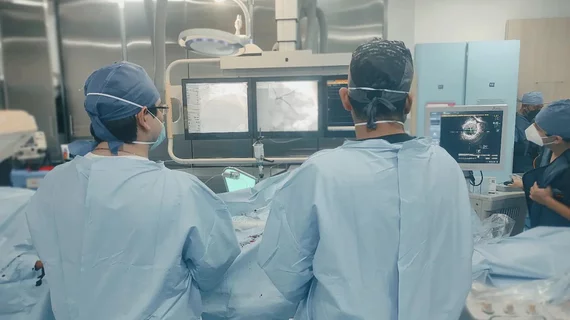Colchicine before PCI: New research tracks the long-term impact on heart health
Administering a one-time dose of colchicine before percutaneous coronary intervention (PCI) does not reduce a patient’s major adverse cardiovascular event (MACE) risk, according to new research published in the American Journal of Cardiology[1]. It does, however, appear to provide certain anti-inflammatory benefits.
The study’s authors shared long-term follow-up data from the Colchicine-PCI trial, which compared colchicine administration before PCI with a placebo. A total of 400 patients were treated with PCI, including 206 who received a one-time loading dose of colchicine and another 194 who received a placebo.
The mean follow-up period for study participants was nearly three and a half years. The MACE rate was not statistically different among patients given colchicine (32.5%) and those given the placebo (34.9%). In addition, there were no significant differences in rates of type 4a myocardial infarctions, spontaneous myocardial infarctions, target vessel revascularization or all-cause mortality.
Colchicine did appear to lead to a “dampening” of the body’s inflammatory response in the original Colchicine-PCI trial, researchers noted. This was seen in colchicine’s ability to attenuate the increase in both interleukin-6 and high-sensitivity C-reactive protein concentrations in PCI patients when compared to a placebo. Additional information on those outcomes are available in Circulation: Cardiovascular Interventions.[2]
Could colchicine have made a bigger impact on long-term outcomes if patients received more than a single dose? It is possible, researchers noted, but more research would be required to be certain.
“Colchicine may need to be continued daily after PCI to show longer-term benefit as observed in previous studies,” wrote first author Binita Shah, MD, MS, an interventional cardiologist with the cardiac catheterization laboratory at NYU Langone Health, and colleagues. “However, given that the benefit in the inflammatory response to vascular injury in the Colchicine-PCI trial was observed 24 hours after PCI, it remains uncertain whether earlier colchicine administration before PCI may confer greater benefit.”
Key context: Colchicine’s historic FDA approval
In June 2023, colchicine became the first anti-inflammatory medication approved by the U.S. Food and Drug Administration (FDA) for treating cardiovascular disease. Cardiologists, especially those in the field of preventive cardiology, were quick to voice their support of the FDA’s decision.
“Approval by the FDA of the first drug to target cardiovascular inflammation is an important step forward for the care of our patients,” Paul Ridker, MD, MPH, a professor of medicine at Harvard Medical School and director of the Center for Cardiovascular Disease Prevention at Brigham and Women’s Hospital, said in a statement at the time. “To treat coronary disease effectively, cardiologists must aggressively reduce inflammation and cholesterol.
Read the full study from Shah et al. here.

